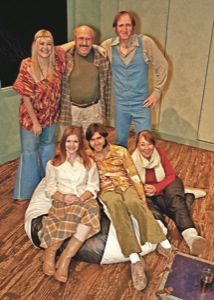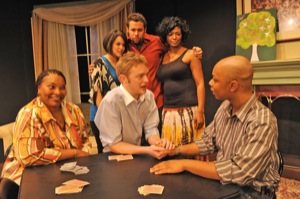-
- Evangelical pastor in gay scandal, now on comeback trail
- Suspects charged in gang rape of lesbian
- Same-sex marriage foes want donors anonymous
- Prop. 8 backers blast Calif. Attorney General
- New Mexico finalizes rules for medical marijuana
- Mesa councilman wants domestic-partner registry
- National News Briefs
- World News Briefs
Theater
Society’s dregs, romance gone wrong and playing the race (and gay) cards
Published Thursday, 15-Jan-2009 in issue 1099
‘What We Talk About When We Talk About Love, and Other Modern Dilemmas’
Whether writer Raymond Carver was a minimalist, as described by many critics, or victim of an overactive editor (Gordon Lish of The New Yorker), as widow Tess Gallagher maintains, there is little doubt of his influence on the craft of short story writing.
Carver is credited with starting the renaissance of realism in the short story following the experimental prose period of the ’60s. Carver’s prose reads like Hemingway with a Chekhovian sensibility (Carver reported Chekhov as an important influence).
Laterthanever Productions’ artistic director Federico Moramarco has adapted three Carver short stories from his 1988 collection Where I’m Calling From for the stage. What We Talk About When We Talk About Love, and Other Modern Dilemmas plays through Sunday, Feb. 1 at the Tenth Avenue Theatre.
The stories are “What We Talk About When We Talk About Love,” “Put Yourself in My Shoes” and “What’s in Alaska?” Directorial duties are shared: “What We Talk About” by Moramarco, the other two by Glynn Bedington.
The three pieces are set in succeeding decades, beginning in the ’70s with “What’s in Alaska?” Here, Mary (Krista Bell) plays passive-aggressive games with husband Jack (Jude Evans), whose new shoes she does not like. Jack considers it a minor triumph that he got to pick them out himself.
When friends Helen (Jacque Wilke) and Carl (Neil MacDonald) show up with their new hookah and the pot starts having its effect, tongues loosen, Helen gets more and more giggly, Mary makes out with Carl in the kitchen and the evening ends on the “bummer” Mary keeps insisting Jack is on.
“Put Yourself in My Shoes” depicts a bizarre Christmas visit by writer Myers (Evans) and his wife Paula (Bell) to the older Edgar (MacDonald) and Hilda (Wilke), for whom they had housesat while the Morgans were in Europe. The Morgans pick this festive occasion to accuse the Myers of vandalizing their possessions and of bringing a cat into the house counter to their agreement.
The longest story, “What We Talk About When We Talk About Love,” examines what love is and where it goes.
Fine acting, great costumes (especially those bell-bottoms, oh my!) and lots of furniture moving between pieces can’t obscure the fact that much of the power in these stories resides in what is not said, which does not translate well to the stage. Carver’s couples never seem to quite finish a thought or an emotion. They talk, all right, but there’s an unspoken subtext beneath the words that hangs in the air. Carver’s characters don’t seem to know quite what they want, but most of them seem quite certain that what they have isn’t it. I didn’t quite get what I wanted, either.
What We Talk About When We Talk About Love, and Other Modern Dilemmas plays through Sunday, Feb. 1, at the Tenth Avenue Theatre. Shows Thursday at 7:30 p.m.; Friday at 8 p.m.; Saturday at 4 and 8 p.m.; Sunday at 7 p.m. For tickets call 619-235-9353 or visit www.laterthanever.org.
‘American Buffalo’
It’s tempting to posit a connection between these belt-tightening times of soaring unemployment and massive governmental deficits and the fact that two shows by so-called minimalist writers have opened in the same week. Is everything being downsized except deficits?
Of course, theater schedules being what they are, there is no such association. Still, get ready for two plays in which social dysfunction and verbal fragmentation are on display.
David Mamet, regarded by some as the greatest living American playwright, made his Broadway debut with the 1976 American Buffalo, a story of minor-league crooks planning a revenge robbery. Compass Theatre presents a fine production of this American classic through Feb. 15, directed by Ruff Yeager.
Here’s the setup: Don (Walter Murray), proprietor of a cluttered junk resale shop, has sold a buffalo head nickel for $90. Though that is more than he thought it worth, he now thinks it is probably worth far more and wants it back.
Don has enlisted his young gofer Bobby (Nathan Dean Snyder) for the heist. At the top of the show, the young junkie screwup angers his mentor by leaving his stakeout post outside the mark’s house and returning to the shop.
At about this time the third character arrives: the misogynist Walt, aka Teach (Matt Scott), full of anger and nervous energy, raging about a supposed slight from the unseen Ruth and Grace. Teach inhabits a hostile world based on distrust and manipulation, and though he bloviates about business and free enterprise, he operates on the principle that the end justifies the means.
This trio is typical of Mamet’s characters: men without women, competitive, greedy, with little ambition and no direction. Teach represents the worst aspects of American capitalism. Bobby, lacking intellectual acuity and victim of his own addiction, regards Don as a father figure. Don has few pretensions and little ambition, but easily falls prey to greed. He does, however, show at least a spark of humanity.
Mamet trades in exploring the dark side of the American psyche. He’s better with male characters, and this trio demonstrates the rat-a-tat conversational style now known as Mametspeak for which he has become famous. Mamet didn’t invent the style: guys do talk in that fragmentary way. But Mamet gets credit for using it onstage.
This production boasts a great cast, excellent directing and an intelligent use of space. Not to be slighted is Chad Jaeger’s wondrously cluttered set design; Matt Scott gets credit for its construction.
Murray is terrific as the steadying influence in the group. Not given to emotional outbursts or wild tangents, he tries to keep a lid on Teach’s unpredictable temper.
Snyder’s Bobby is just what you’d expect of a kid with no future: tentative, trying to please Don, but wanting to be let in on grownup plans. But what’s with that costume? He looks like he sleeps in a dumpster.
Scott’s Teach sits on an emotional powder keg that explodes from time to time in small but frightening ways. It’s an exciting portrayal that occasionally becomes a bit overwrought (especially his tic-like habit of sticking his tongue out). But it’s impossible not to watch him.
Mamet has made important contributions to theater (not to mention film) with his portrayals of some of the less attractive aspects of American society. Long known as a liberal voice, he changed sides early in 2008, which he explained in a Village Voice article entitled “Why I Am No Longer a Brain-Dead Liberal.” It will be interesting to see how this will affect his future plays.
Meanwhile, we have a terrific production of American Buffalo to see.
American Buffalo plays through Sunday, Feb. 15, at Compass Theatre. Shows Thursday and Friday at 8 p.m.; Saturday at 4 and 8 p.m.; Sunday at 2 p.m. For tickets call 619-688-9210 or visit www.compasstheatre.com.
‘As Much As You Can’
Meeting The Family is almost always a stressful event, seldom as amusing as it is in Paul Oakley Stovall’s As Much As You Can, now in a short run through Sunday, Jan. 25 at Diversionary Theatre. Antonio T.J. Johnson directs.
A family wedding in Chicago demands the attendance of gay, black Jesse Bryant (Kevane La’Marr Coleman), who makes the Big Decision to take his paleface Swedish boyfriend Kristian (Brian Mackey) along. Jesse hasn’t quite come clean, though; he’s only told Bible-thumping big sister Evie (Ida L. Rhem) that Kristian is a “friend” who will photograph the big event. Jesse is so fearful of Evie’s reaction that he’s even arranged other living accommodations for Kristian.
Along for the ride are Jesse’s best girlfriend Nina (Melissa Coleman Reed), a lesbian pistol with a big mouth who walks right off with the show, Jesse’s half-sister Ronnie (Leticia Martinez) and brother Tony (Patrick Kelly), the groom.
Over marathon card games and heartfelt talks in another room, the plea for tolerance is made, as is the point that home is indeed the place you can always go back to.
Though some of the lines are less than subtle, preachy sections a bit overlong and family reunification a bit too facile, Stovall’s characters are charming and fun to watch and As Much As You Can is an immensely appealing show.
As Much As You Can plays through Sunday, Jan. 25, at Diversionary Theatre. Shows Wednesday and Thursday at 7:30 p.m.; Friday and Saturday at 8 p.m.; Sunday at 2 and 7 pm. For tickets call 619-220-0097 or visit www.diversionary.org.
|
|
Copyright © 2003-2025 Uptown Publications



